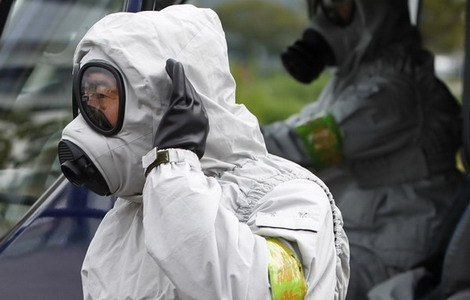Beijing to burn 40% of household waste
Updated: 2011-09-02 08:25
By Cheng Yingqi (China Daily)
|
|||||||||||
BEIJING - The Beijing municipal government is planning to incinerate 40 percent of household waste by the end of 2015, officials said on Thursday.
Last year, only 10 percent of the waste was incinerated.
Wang Yingjian, a senior official from the municipal commission of development and reform, announced the plan at a news conference to release the city's new development and construction plan.
"During the 12th Five-Year Plan (2011-2015) Beijing will still face challenges brought by limited natural resources and a growing population, which will lead to problems in water supply, traffic congestion, waste disposal and sewage treatment," Wang said.
Beijing produced 18,300 tons of household garbage every day in 2009 and the number dropped to 17,400 tons in 2010. The daily disposal capacity increased from 12,700 tons to 16,700 tons, according to official data.
"We are planning to transform 55 percent of solid household waste into resources in the coming five years, and to increase the city's daily disposal capacity to 30,000 tons," Wang said.
"Moreover, 40 percent of household waste will go to the garbage-burning plants, while the rate was only 10 percent in 2010," he said.
The municipal government revealed that currently 80 percent of waste is being put into landfill, with 10 percent going through a biochemical process and another 10 percent is burned.
By 2015, the ratio will be 3:3:4.
"The ratio is not feasible without continuous measures to promote garbage sorting among the public, because kitchen waste will have to be classified first and then made into organic fertilizer," said Xu Haiyun, chief engineer of the China Urban Construction Design and Research Institute.
"However, since I do not see much chance of people sorting garbage thoroughly, I don't believe it is possible to turn as much as 30 percent of household garbage into fertilizer," Xu said.
Xu suggested the government should reduce the use of biological treatment for organic waste, and increase incineration.
Huang Xiaoshan, an environmental activist in Beijing, said he would support incineration only if people classify garbage properly.
"Without garbage sorting, the harmful material contained in the garbage will produce toxic gas and badly affect people living close to incineration operations," Huang said.
"But I am trying to set an example for the government to find a possible way to implement garbage sorting."
In late July, Huang invested in a garbage-sorting station he called "the green house", which later received the support of the Beijing government.
Hot Topics
Libya conflict, Gaddafi, Oil spill, Palace Museum scandal, Inflation, Japan's new PM, Trapped miners, Mooncake tax, Weekly photos, Hurricane Irene
Editor's Picks

|

|

|

|

|

|







